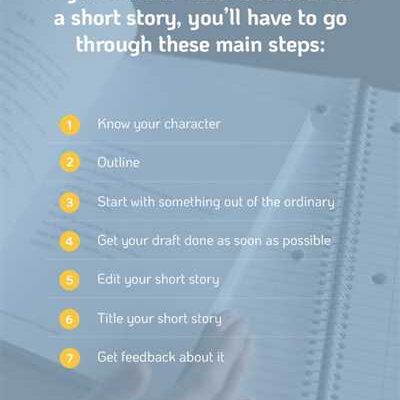
Writing your self story can be a powerful way to reflect on your life, understand your journey, and share your experiences with the world. Whether you’re a strong writer or not, deciding to put your story into words is a brave and important step. It’s a chance to dive deep into your memory and organize your thoughts in order to create a written piece that truly reflects who you are. In this article, we’ll explore some tips and steps on how to write your self story and create a book that will captivate your readers.
The first tip is to focus on where you want to start. Often, it’s not just about writing a chronological account of your life, but about choosing a significant moment or theme to begin with. This could be a turning point, a difficult challenge, or an inspiring achievement. By starting with an impactful event, you can capture your readers’ attention and draw them into your story.
Another important tip is to be open and honest. Your self story should not only be a recollection of events, but also an exploration of your thoughts, emotions, and growth throughout your life. By sharing your vulnerabilities and triumphs, you allow your readers to connect with you on a deeper level and relate to your experiences.
One key step in writing your self story is to remember that you’re not just a writer, but also the protagonist of your own story. This means that you have the power to shape the narrative and decide what aspects of your life to focus on. It’s important to take a step back and reflect on the lessons you’ve learned, the challenges you’ve overcome, and the person you’ve become. By doing so, you can create a conclusion that leaves your readers feeling inspired and confident in their own journeys.
When organizing your self story, it can be helpful to break it down into different chapters or sections. For example, you could dedicate a chapter to your childhood, another to your career, and so on. This not only helps you structure your story, but also allows your readers to easily navigate through different periods of your life. Additionally, don’t forget to include vivid descriptions and sensory details to bring your story to life and transport your readers to your world.
Writing your self story is not an easy task, but with the right approach and mindset, it can be a rewarding and fulfilling endeavor. Just remember to be confident in your voice, stay true to your experiences, and let your passion for storytelling guide you along the way. So go ahead, take a pen and paper, or open a blank document, and start writing your self story today!
So you want to write your story but you’re not a writer
Writing your own story can be a daunting task, especially if you don’t consider yourself a writer. But don’t worry, you don’t have to be a professional writer to write a meaningful and engaging story. All you need is a strong desire to share your experiences and memories with others.
First and foremost, be confident in yourself and your story. Remember, you are the expert when it comes to your own life. No one else can tell your story with the same authenticity and perspective as you can. So don’t let the fact that you’re not a seasoned writer hold you back.
Start by taking small steps. Decide on the main theme or focus of your story. What do you want to communicate or share with your readers? Perhaps it’s a lesson you’ve learned, an experience that shaped you, or simply a collection of memories that you want to preserve.
Next, organize your thoughts and memories. Writing a book is often about finding order in the chaos of life. Take some time to reflect on your past and jot down any important events or moments that come to mind. You can even create an outline to help you structure your story.
Remember, writing is a process. Don’t get discouraged if you don’t have all the details or if you’re not sure how to start. Just write. You can always go back and revise or add more later. The important thing is to get your story down on paper.
If you’re not sure where to start, there are many resources and writing tips available. You can read books or articles about writing memoirs or browse online for helpful guides. Don’t be afraid to reach out for assistance or seek feedback from others.
In conclusion, writing your own story is not about how to become a professional writer, but about sharing your unique experiences and perspectives with the world. So, if you have a strong desire to write, don’t let the fact that you’re not a writer hold you back. Take the first step, organize your thoughts, and start writing your story. You never know how impactful it can be.
Tip 2: Start with a strong memory

When writing your self-story, it can often be helpful to start with a strong memory. Memories are the key to unlocking the essence of your life experiences and can help you organize your thoughts as you begin to write.
To start, take some time to remember a specific event or moment from your past that holds significance to you. It could be a moment of personal triumph, a challenging obstacle you overcame, or even a moment of deep reflection. Whatever memory you decide to focus on, make sure it is a memory that resonates with you and can shed light on who you are as a person.
Writing about a strong memory not only helps you to remember and relive a specific moment in your life, but it also allows you to share that experience with others. By taking the reader back in time, you can provide a vivid and personal glimpse into your world, creating a connection between your story and the reader.
However, it is important to note that you don’t have to start with the beginning of your life and write in chronological order. In fact, it’s often better to jump around and write about memories as they come to mind. The order in which you write your memories doesn’t matter – the goal is to get them written down and capture their essence.
Remember, you’re not just writing a book, but rather revealing a significant part of your life. So, open up and be confident in sharing your story. Writing about a strong memory can be an emotional journey, but it can also be incredibly rewarding. Trust yourself as a writer, and let the memories guide you.
In conclusion, tip 2 is to start with a strong memory. Take the time to remember and write about significant moments from your life. It’s okay to jump around and not write in chronological order. The main goal is to capture the essence of your memories and share your story with the world. So, start writing and let your strong memories guide you!
Decide How to Organize Your Story
When writing your own story, it’s important to remember that you’re the one in control. You get to decide how to organize your memories and what aspects of your life to focus on.
One tip is to start with a strong opening that grabs the reader’s attention. This could be a significant moment from your past or an intriguing question that will keep them wanting to know more.
Another option is to organize your story in chronological order, from the earliest memories to the most recent. This can give your readers a sense of the progression of your life and how you’ve changed over time.
If you have a specific theme or message you want to convey, you can organize your story around that. Think about what you want your readers to take away from your story and how you can structure it to support that message.
Remember, as the writer, you have the power to decide what to include and what to leave out. Not every memory or detail needs to be written about. Focus on the moments and experiences that are most important to your story.
So, don’t feel confined to a strict order or structure. If it makes sense for your story, you can jump around in time or include flashbacks. The important thing is to have a clear and cohesive narrative that engages your readers.
Finally, as you write your story, it’s important to stay open to new ideas and perspectives. Your memory of events may differ from others involved, and that’s okay. This is your story, and you have the right to tell it from your point of view.
In conclusion, when deciding how to organize your self story, there are no set rules. Take the time to reflect on your memories, think about the message you want to convey, and be confident in your storytelling abilities. By taking these steps, you can create a unique and compelling narrative that shares your experiences with the world.
Conclusion on How to Write a Book About Your Life

Writing a book about your life is a challenging and rewarding experience. It allows you to focus on your own story and share it with the world. It is often a cathartic process that can help you understand yourself better and find closure in past events.
When you decide to write a book about your life, it’s important to remember that you’re not just a writer, but the main character in your own story. You have the power to shape and organize your memories in a way that makes sense to you and your readers.
Start by taking some time to reflect on your life and what you want to share with others. Consider the themes and messages you want to convey in your book. This will help you decide on the order and structure of your story.
It’s important to have a strong start that grabs your readers’ attention and keeps them engaged throughout the book. You can use vivid descriptions, powerful anecdotes, or thought-provoking questions to hook your readers from the first page.
As you write, make sure to be confident in your voice and storytelling abilities. Trust that your experiences and perspective are valuable and worth sharing. Don’t be afraid to be vulnerable and honest in your writing.
Remember that writing a book about your life is not just about the events and facts, but also about the emotions and lessons you’ve learned along the way. Use your book as a way to explore and reflect on your journey, and offer insights and advice to your readers.
In order to write a book about your life, you may need to do some research or consult external sources to fill in gaps in your memory or gain a better understanding of certain events. This can add depth and credibility to your story.
When you’re nearing the end of your book, it’s important to have a strong conclusion that wraps up your story and leaves a lasting impression on your readers. You can reflect on how far you’ve come and the lessons you’ve learned, or offer a final thought or piece of advice.
So, if you’re ready to embark on the journey of writing a book about your life, remember to focus on your story, be confident in your writing, and organize your memories in a meaningful order. Take it step by step, and don’t be afraid to revisit and revise as needed. With dedication and perseverance, you can bring your life story to the written page and share it with the world.
Sources
When you decide to write your self-story, there are several sources you can take inspiration from. Here are a few steps on how to start and organize your book:
- Memory: Your own memory is an excellent source for writing your self-story. Remembering the events and moments that shaped your life will give you a strong foundation to start writing.
- World around you: The world you live in can be a great source of inspiration. Take a look at the people, places, and events that influenced your life and include them in your story.
- Research: If you want to include historical or factual information in your self-story, conduct research to gather accurate details. This will add depth and credibility to your writing.
- Open up: Be open and honest about your experiences and emotions. Writing about your truest feelings will make your story more relatable and impactful.
- Talk to others: Discussing your life experiences with others can provide valuable insights and perspectives. Their input can help you reflect on your past and gain a deeper understanding of yourself.
- Focus on a theme: Decide on a central theme or message you want to convey through your self-story. This will give your writing a clear direction and purpose.
- Order the events: Organize the events in your self-story in a logical and chronological order. This will help readers follow your journey and understand the progression of your life.
- Conclusion: Wrap up your self-story with a thoughtful conclusion. Reflect on the lessons learned and the growth you have experienced throughout your life.
- Be confident: Remember, you don’t need to be an experienced writer to write your self-story. Just have confidence in your own voice and story.
By following these tips and using the various sources available to you, you can write a compelling and meaningful self-story that captures the essence of your life.










